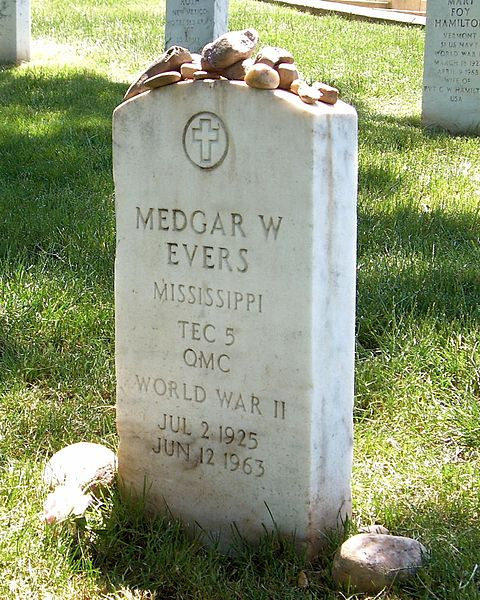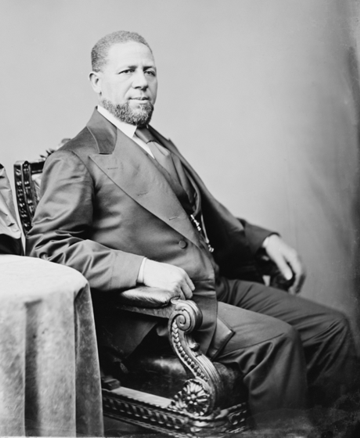After returning home from World War II, veteran Medgar Evers decided to vote in a Mississippi election. But when he and some other black ex-servicemen attempted to vote, a white mob stopped them. “All we wanted to be was ordinary citizens,” Evers later related. “We fought during the war for America, Mississippi included. Now, after the Germans and Japanese hadn’t killed us, it looked as though the white Mississippians would....”
 |
|
Grave of civil rights activist Medgar Evers in Arlington National Cemetery. (Wikimedia Commons) |
The most basic right of a citizen in a democracy is the right to vote. Without this right, people can be easily ignored and even abused by their government. This, in fact, is what happened to African-American citizens living in the South following Civil War Reconstruction. Despite the 14th and 15th Amendments guaranteeing the civil rights of black Americans, their right to vote was systematically taken away by white supremacist state governments.
Voting During Reconstruction
After the Civil War, Congress acted to prevent Southerners from re-establishing white supremacy. In 1867, the Radical Republicans in Congress imposed federal military rule over most of the South. Under U.S. Army occupation, the former Confederate states wrote new constitutions and were readmitted to the Union, but only after ratifying the 14th Amendment. This Reconstruction amendment prohibited states from denying “the equal protection of the laws” to U.S. citizens, which included the former slaves.
In 1870, the 15th Amendment was ratified. It stated that, “The right of citizens of the United States to vote shall not be denied or abridged by the United States or by any State on account of race, color, or previous condition of servitude.”
More than a half-million black men became voters in the South during the 1870s (women did not secure the right to vote in the United States until 1920). For the most part, these new black voters cast their ballots solidly for the Republican Party, the party of the Great Emancipator, Abraham Lincoln.
When Mississippi rejoined the Union in 1870, former slaves made up more than half of that state’s population. During the next decade, Mississippi sent two black U.S. senators to Washington and elected a number of black state officials, including a lieutenant governor. But even though the new black citizens voted freely and in large numbers, whites were still elected to a large majority of state and local offices. This was the pattern in most of the Southern states during Reconstruction.
The Republican-controlled state governments in the South were hardly perfect. Many citizens complained about overtaxation and outright corruption. But these governments brought about significant improvements in the lives of the former slaves. For the first time, black men and women enjoyed freedom of speech and movement, the right of a fair trial, education for their children, and all the other privileges and protections of American citizenship. But all this changed when Reconstruction ended in 1877 and federal troops withdrew from the old Confederacy.
Voting in Mississippi
With federal troops no longer present to protect the rights of black citizens, white supremacy quickly returned to the old Confederate states. Black voting fell off sharply in most areas because of threats by white employers and violence from the Ku Klux Klan, a ruthless secret organization bent on preserving white supremacy at all costs.
White majorities began to vote out the Republicans and replace them with Democratic governors, legislators, and local officials. Laws were soon passed banning interracial marriages and racially segregating railroad cars along with the public schools.
Laws and practices were also put in place to make sure blacks would never again freely participate in elections. But one problem stood in the way of denying African Americans the right to vote: the 15th Amendment, which guaranteed them this right. To a great extent, Mississippi led the way in overcoming the barrier presented by the 15th Amendment.
 |
|
Hiram Rhodes Revels was the first African American to serve in the U.S. House of Representative and later the Senate. Revels served in Congress from 1870 to 1871, representing Mississippi. (Wikimedia Commons) |
In 1890, Mississippi held a convention to write a new state constitution to replace the one in force since Reconstruction. The white leaders of the convention were clear about their intentions. “We came here to exclude the Negro,” declared the convention president. Because of the 15th Amendment, they could not ban blacks from voting. Instead, they wrote into the state constitution a number of voter restrictions making it difficult for most blacks to register to vote.
First, the new constitution required an annual poll tax, which voters had to pay for two years before the election. This was a difficult economic burden to place on black Mississippians, who made up the poorest part of the state’s population. Many simply couldn’t pay it.
But the most formidable voting barrier put into the state constitution was the literacy test. It required a person seeking to register to vote to read a section of the state constitution and explain it to the county clerk who processed voter registrations. This clerk, who was always white, decided whether a citizen was literate or not.
The literacy test did not just exclude the 60 percent of voting-age black men (most of them ex-slaves) who could not read. It excluded almost all black men, because the clerk would select complicated technical passages for them to interpret. By contrast, the clerk would pass whites by picking simple sentences in the state constitution for them to explain.
Mississippi also enacted a “grandfather clause” that permitted registering anyone whose grandfather was qualified to vote before the Civil War. Obviously, this benefited only white citizens. The “grandfather clause” as well as the other legal barriers to black voter registration worked. Mississippi cut the percentage of black voting-age men registered to vote from more than 90 percent during Reconstruction to less than 6 percent in 1892. These measures were copied by most of the other states in the South.
The Winds of Change
As a result of intimidation, violence, and racial discrimination in state voting laws, a mere 3 percent of voting-age black men and women in the South were registered to vote in 1940. In Mississippi, less than 1 percent were registered. Most blacks who did vote lived in the larger cities of the South.
By not having the power of the ballot, African Americans in the South had little influence in their communities. They did not hold elected offices. They had no say in how much their taxes would be or what laws would be passed. They had little, if any, control over local police, courts, or public schools. They, in effect, were denied their rights as citizens.
Attempts to change this situation were met with animosity and outright violence. But in the 1950s, the civil rights movement developed. Facing enormous hostility, black people in the South organized to demand their rights guaranteed in the U.S. Constitution. They launched voter registration drives in many Southern communities. This set the stage for great changes in the 1960s, but not without tragedy. Medgar Evers, the black veteran stopped by a white mob from voting, became a civil rights leader in his native Mississippi. Because of his civil rights activities, he was shot and killed in front of his home by a white segregationist in 1963.
For Discussion and Writing
- What legal devices did Southern states use to exclude most of their black citizens from voting? What other methods were used to stop blacks from voting?
- What was unfair about the way literacy tests were used for voter registration in the South from 1890 to 1965?
- What were the consequences to African Americans of being excluded from voting in the segregated South?
For Further Reading
McMillen, Neil R. Dark Journey: Black Mississippians in the Age of Jim Crow. Urbana, Ill.: University of Illinois Press, 1990.
Bond, Julian & Juan Williams. Eyes on the Prize: America’s Civil Rights Years, 1954–1965. New York: Penguin Books, 1988.
A C T I V I T Y
Who Should Not Vote?
All states have some voting restrictions. Are they necessary? Below are five traditional restrictions on the right to vote. Form small groups to decide whether your state should retain each of these restrictions. Before making a decision on each restriction, the group should discuss and write answers to these two questions:
- What are some reasons favoring the restriction?
- What are some reasons against the restriction?
After the groups have finished their work, each restriction should be discussed and voted on by the entire class.
Restrictions on the Right to Vote
In order to vote, you must...
A. Reside in a voting district for at least one month.
B. Be at least 18 years of age.
C. Not be in prison or on parole for a felony conviction.
D. Be a U.S. citizen.
E. Register to vote.

